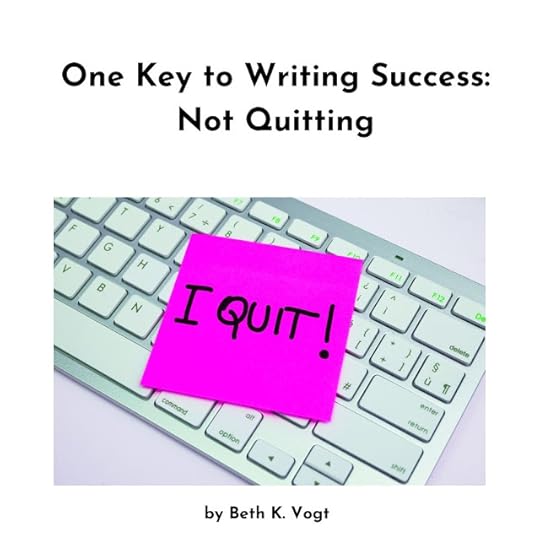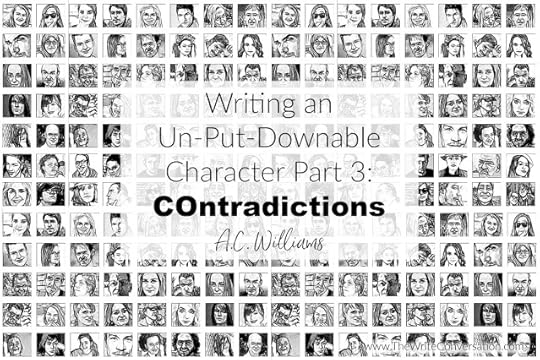Edie Melson's Blog, page 130
April 9, 2022
Do the Right Write

by Martin Wiles @LinesFromGod
They tried not to, but they just couldn’t help themselves.
Computer class. I was the teacher, assigning my students papers to write. The trouble? Two middle school classes and several high school classes used the same computers. On those computers existed the files of all the students who used them currently and had in the past. Any student could access or alter any of the files. And some of mine had.
How did I know? A few students in the class finished assignments too quickly. When I investigated, I discovered their antics. They had found a file of another student—who had already completed the assignment—and then copied and pasted it into their document. After renaming it as their own, they proudly said, “I’m finished.”
One young man, more honorable than the rest who didn’t admit what they had done, approached me and asked if he could do what his classmates had done. I told him no. He didn’t. Others did it without asking. I reminded them about plagiarism and its consequences, both inside and outside the classroom. Since I’m older and wiser—and probably would have done the same thing when I was their age—I figured out a way to help them do the right write.
Martin Luther King, Jr., said, “On some positions, cowardice asks the question, is it expedient? And then expedience comes along and asks the question, is it polite? Vanity asks the question, is it popular? Conscience asks the question, is it right?”
Paul must have known how easy it can be to tire of doing the right things, especially when the crowd typically does the wrong thing. He encouraged the Thessalonians to keep doing right, regardless of what others did.
“As for the rest of you, dear brothers and sisters, never get tired of doing good” (2 Thessalonians 3:13 NLT).
The right thing for us writers is to use the write voice God has given us. I’ll never be a Max Lucado, Charles Stanley, Steven King, or J. K. Rowling. Early in my writing journey, this bothered me, but not anymore. Sure, I could gorge on their works so much that I could learn to sound like them, but that’s not God’s plan for me or any other writer. God wants us to write with the right voice—the one He has given us. Whether our books become best-sellers isn’t the point. Nor is whether our devotions, articles, or short stories get accepted by name-brand publications. The right write uses the voice God gave us and trusts Him to do what He wills with our writing.
Doing the right morally also takes courage. For the one young man who refused to follow the example of many of his classmates, doing right meant more time working on the assignment—and even doing so at home while the others probably played video games or socialized with their friends.
Standing alone comes with a price. So does ignoring the pressure by others to take the shortcut, even if it violates moral principles and ethical writing principles.
Only by the grace and strength of God’s Spirit can we consistently do the right thing—and the write thing. The Bible defines this as integrity, and, as writers and believers, we need to show the world an abundance of this.
Ask God for the courage to do the right thing (and the right write) under all circumstances.
TWEETABLEDo the Right Write, insight from author Martin Wiles, @LinesFromGod on @EdieMelson (Click to Tweet)
 Martin Wiles is the founder of Love Lines from God (www.lovelinesfromgod.com) and serves as Managing Editor for Christian Devotions, Senior Editor for Inspire a Fire, and Proof Editor for Courier Publishing. He has authored six books and has been published in numerous publications. His most recent book, DON'T JUST LIVE...REALLY LIVE, debuted in October of 2021. He is a freelance editor, English teacher, author, and pastor.
Martin Wiles is the founder of Love Lines from God (www.lovelinesfromgod.com) and serves as Managing Editor for Christian Devotions, Senior Editor for Inspire a Fire, and Proof Editor for Courier Publishing. He has authored six books and has been published in numerous publications. His most recent book, DON'T JUST LIVE...REALLY LIVE, debuted in October of 2021. He is a freelance editor, English teacher, author, and pastor.
Published on April 09, 2022 22:00
April 8, 2022
One Key to Writing Success: Not Quitting

by Beth K. Vogt on @BethVogt
I was chatting with author Edie Melson the other day, one of those spontaneous phone calls that leaves you smiling hours later. We talked about real life and our writing lives—specifically her involvement with Blue Ridge Mountains Christian Writers Conference (BRMCWC) . Not just her involvement, but how her leadership has helped BRMCWC grow into one of the premier writing conferences in the country.
Edie explained her success this way: I just don’t quit.
And then she laughed.
But not quitting is no laughing matter.
My response to Edie was this: Not quitting is very hard.
Think about that for a minute, friends.
We all face days when quitting would be the easy thing to do. You power down the laptop, push away from your writing desk, and be done with writing. You’re finished with:The maybesThe w-a-i-t-i-n-gThe financial strugglesThe disappointments of failureThe stressors of successThe deadlinesThe comparison traps The imposter syndrome
Quitting means you don’t do any of that anymore.
Choosing not to quit? That’s the hard choice. The brave choice. The choice that is going to cost you time and effort and hard work.
Not quitting means you persevere. You juggle competing time demands. Rewrite scenes because they’re not quite right. Ignore reviews—good ones and bad ones—because they can play havoc with our mental health. Find your community who’ll support you because other writers “get us.”
I wrote a blog post months ago about eliminating the words “I quit” from our vocabulary. My suggestion back then was to abandon the words “I quit” and instead ask, “What’s next?”
Edie always looks for the next thing God has waiting for her. Her faith is bigger than any doubts that come knocking on her door. She takes time to refresh her spirit and she also encourages others to take care of themselves by leaning into God through creativity. If you haven’t already done so, check out her series of books on Soul Care .
TWEETABLEOne Key to Writing Success: Not Quitting - insight from author @BethVogt on @EdieMelson (Click to Tweet)
 Beth K. Vogt believes God’s best often waits behind the doors marked “Never.” Having authored nine contemporary romance novels and novellas, The Best We’ve Been, the final book in Beth’s Thatcher Sisters Series with Tyndale House Publishers, releasers May 2020. Other books in the women’s fiction series include Things I Never Told You, which won the 2019 AWSA Award for Contemporary Novel of the Year, and Moments We Forget. Beth is a 2016 Christy Award winner, a 2016 ACFW Carol Award winner, and a 2015 RITA® finalist. An established magazine writer and former editor of the leadership magazine for MOPS International, Beth blogs for Learn How to Write a Novel and The Write Conversation and also enjoys speaking to writers group and mentoring other writers. Visit Beth at bethvogt.com.
Beth K. Vogt believes God’s best often waits behind the doors marked “Never.” Having authored nine contemporary romance novels and novellas, The Best We’ve Been, the final book in Beth’s Thatcher Sisters Series with Tyndale House Publishers, releasers May 2020. Other books in the women’s fiction series include Things I Never Told You, which won the 2019 AWSA Award for Contemporary Novel of the Year, and Moments We Forget. Beth is a 2016 Christy Award winner, a 2016 ACFW Carol Award winner, and a 2015 RITA® finalist. An established magazine writer and former editor of the leadership magazine for MOPS International, Beth blogs for Learn How to Write a Novel and The Write Conversation and also enjoys speaking to writers group and mentoring other writers. Visit Beth at bethvogt.com.
Published on April 08, 2022 22:00
April 7, 2022
The Lord’s Prayer for Writers (Part 2)

by Joshua J. Masters @JoshuaJMasters
It is the depth of their connection to God, not the depth of their words, that measures the life of a Christian writer. And we build that relationship in sincere, continual moments of conversational prayer. Yet, we often allow the tasks of our writing to take priority over the One who’s called us to that career.
In The Lord’s Prayer for Writers (Part 1) , we explored the first stanza of Christ’s model for prayer found in Matthew 6. We focused on how writers should approach God relationally as our Father, with reverence for His holiness, and resigned to His will.
The evaluation of our heart when we come before God is not only vital to our writing careers, but to our life with Christ.
This month, we’ll look at the next stanza of the prayer outline Jesus gave us:
Give us today our daily bread.And forgive us our debts,as we also have forgiven our debtors. (Matthew 6:11-12 NIV)
If the first stanza of the prayer represented how we approach God, this section represents our relationship with Him and others.
HERE ARE THREE THINGS TO REMEMBER AS WE PRAY ABOUT OUR WRITING:
1. Pray to Receive your Needs.
“Give us today our daily bread.…”
God is deeply involved in every detail of the calling He’s given you, and He will provide everything you need to fulfill His purpose for your life.
The problem is our inability to understand the difference between what we need and what we want. It’s important we ask God to show us the distinction, because the things we want will often impede what God intends to accomplish through our writing.
When Jesus told us to pray for our daily bread, He was making a direct reference to God’s provision for the Israelites as they left Egypt. Every day, God miraculously provided manna that was made into bread so they could make their journey to the Promised Land. But the Israelites rejected God’s provision and miracles, longing for the food they received in slavery.
As we pray for our writing, we must avoid saturating our prayers with so many earthly desires we miss the miraculous provisions God’s already offered in our writing and lives.
The term “daily bread” is a day-by-day trust in God’s ability and promise to give us what we need. Is that enough for us? Can we live in His daily provision and trust the outcome of our writing to Him? Finding that place of peace in prayer removes the anxiety from the uncertain life of a writing career.
Does that mean we can’t pray for that new writing software or an upcoming conference? Of course not. But we should focus on our needs over our desires with gratitude. For it is gratitude that unlocks the blessings of God.
2. Pray to Repent from Sin.
“And forgive us our debts...”
This phrase is more accurately translated, “forgive us our sin.” This is important because sin creates a barrier in our relationship with God. When that happens, we become self-focused in our writing, leaning on our own strength rather than God’s plan.
Like the Israelites, sin will lead us to say, “I don’t need or want Your provision, God. I’ll do this my way.” That’s when our writing stops honoring God and becomes an idol.
Sin in the life of a writer could be rooted in lust, gluttony, pride, or greed, just like anyone else. But we may find sin deeply entrenched in the very gift God has given us—our writing. Comparison with other writers, an unhealthy desire for success, and validation through accolades all stem from a sinful nature that distracts us from the work God wants to do in and through our writing.
This phrase in the prayer is not about salvation. For believers, Christ has fully and completely atoned for our sins. This is about our relationship with the Father and our willingness to repent from the ongoing sin that prevents us from hearing His direction in our writing and daily lives.
Pray God will reveal your stumbling blocks and then pray for His strength to turn away from them.
3. Pray to Reflect His Grace.
“… as we also have forgiven our debtors.”
Your writing will never flow with Living Waters if you’ve filled your well with bitterness. It’s impossible to reflect the grace of God in our careers if we don’t extend that grace in our lives.
Having gratitude for God’s provision and an understanding of His forgiveness in our own lives will lead to a heart of forgiveness toward others. But a lack of forgiveness for those who’ve harmed us drastically affects our relationship with Christ and our ability to represent Him in our writing.
A heart of unforgiveness will taint every word you write for God, because it directly violates His character.
So, we pray for God to help us forgive those who have hurt us, even (and especially) when we think they don’t deserve it.
This is a difficult spiritual discipline that warrants its own article, but the first step to forgiveness is to decide you’re going to forgive, even if it seems impossible. When you can’t fathom how you’ll forgive that person, go to God and pray, “Father, You’ve told me to forgive. You’ve promised You would help me forgive, so I’m deciding right now that I will. I have no idea how to do that, but I trust You will show me. Amen.”
Gratitude for God’s provision, repentance from our sin, and a heart of forgiveness are the edits our souls need to be a more complete, impactful manuscripts for the Kingdom.
But the enemy will use disappointment and discouragement to derail the proofing God wants to do in your life. He may even whisper lies of discouragement to you as you read this column. But don’t believe him. We’ll address how to combat his lies in the next installment of this series.
Until then, believe God will do incredible things in your calling if you surrender your desires and refinement to Him.
TWEETABLEThe Lord's Prayer for Writers (Part 2) from @JoshuaJMasters on @EdieMelson (Click to Tweet)
Don't Miss the Rest of the Posts in This Series!Part 1: The Lord's Prayer for WritersPart 2: The Lord's Prayer for Writers
 Joshua J. Masters is a pastor, author, and speaker with a heart for encouraging others. His book on prayer, AMERICAN PSALMS, was a Serious Writer’s Book of the Decade finalist. He’s been featured on CBN Television, HIS Radio, the Light Radio Network, and worked in the film industry as a member of SAG-AFTRA performer. He is a regular teacher and speaker for large groups. A self-proclaimed sci-fi and comic book geek, Josh loves film, pop culture and is known in some circles as THE BAT PASTOR. Joshua was raised in the White Mountains of New England and now serves as a pastor in South Carolina where he lives with his wife, Gina, and their miniature poodle, FRANKLIN THE PUP, who is the subject of his latest book. Josh would love to connect with you on his website, JOSHUAJMASTERS.COM
Joshua J. Masters is a pastor, author, and speaker with a heart for encouraging others. His book on prayer, AMERICAN PSALMS, was a Serious Writer’s Book of the Decade finalist. He’s been featured on CBN Television, HIS Radio, the Light Radio Network, and worked in the film industry as a member of SAG-AFTRA performer. He is a regular teacher and speaker for large groups. A self-proclaimed sci-fi and comic book geek, Josh loves film, pop culture and is known in some circles as THE BAT PASTOR. Joshua was raised in the White Mountains of New England and now serves as a pastor in South Carolina where he lives with his wife, Gina, and their miniature poodle, FRANKLIN THE PUP, who is the subject of his latest book. Josh would love to connect with you on his website, JOSHUAJMASTERS.COM
Published on April 07, 2022 22:00
April 6, 2022
Managing Writing Deadlines: How to Get Them Right and How to Get Them Wrong!

by Lynn H. Blackburn @LynnHBlackburn
Deadlines are a painful reality for authors. If you do an internet search for how to handle a writing deadline, you’ll find lots of fabulous advice. While the specifics vary, they will inevitably include some common suggestions
How to Manage Writing Deadlines
1. Don’t panic. Stay positive.
2. Stay focused. No social media. No Netflix. No reading. Keep your mind on the story you’re writing.
3. Leave the laundry for later. Or get someone else to do it. Same with housework. Those dust bunnies aren’t hurting anybody. Feed your family takeout and pizza. They can have healthy meals next month.
4. Take plenty of breaks and be sure you’re getting enough sleep. You can’t create if you’re exhausted.
5. Say no to everything you can possibly say no to. You don’t have time for anything extra in your life.
6. Set word count goals and stick to them.
7. BICHOK - Butt in Chair; Hands on Keyboard. This your life until you’re done.
8. Go for a walk or take a shower when you get stuck. You may get some of your best ideas this way.
9. Make time to do other things that will fuel your creativity. Spend time with family and friends, bake a cake, knit, plant a garden, photograph some birds. You have a life other than writing. You’ll be a better writer if you don’t forget that.
10. Drink plenty of water. Hydrated writers are happy writers.
Now, friends, there’s nothing wrong with any of that advice. It’s solid.
But as someone who survived not one but three deadlines in March, I’m afraid that’s just not how it works. At least not for me. So today, I give you some of the ways I handle a deadline.
*** Please note that this list is descriptive not prescriptive. I’m not recommending any of this. In fact, I would say don’t do it. Just. Don’t.***
Lynn’s approach to deadlines:
1. Panic. Just go ahead and freak out. Cry. Pray. Moan. Rock back and forth in your chair as you stare at the blank pages of your manuscript. Trying to avoid this step is futile.
2. Scroll through FB and Instagram every 10-15 minutes. When you finish, google ways to handle writing deadlines. Who knows? This article might show up. If that’s what brought you here, um, yeah, I’m sorry about that.
3. Sleep is for people who’ve turned in their books on time. Until then, get by on the bare minimum to keep you functional. When you do sleep, don’t be surprised when you have alarmingly detailed dreams. Your subconscious is doing the best it can. You’ve stressed your brain to the max. When you finally sleep, it’s processing everything from the meaning of peach roses to the use of strychnine as a modern poison option. Accept the bizarre and move on.
4. Don’t bother cleaning your office/writing space. If you get to the end of your manuscript with a clean desk, you did it wrong. But do give in to the compulsion to clean everything else in your house. This includes closets and drawers that haven’t been touched since your last deadline. And go ahead and do all the laundry. You know you want to.
5. Allow mom/friend guilt to convince you that you do have time to bake a bazillion cookies or throw a party. You can write when you’re done…right?
6. Set word counts goals which would require you to write eight hours a day. Be shocked when you aren’t successful. Adjust goals daily. Never meet them.
7. Sit down to write, but then spend several hours brainstorming your next book. This could include searching out cool names, professions, hobbies, and the tropes you want to use or avoid. Be sure to leave the notes you make all over your desk so they’ll taunt you every time you sit down to finish the book that is due, but which you no longer want to write.
8. Pause several times a day to send pitiful text/voxer/direct messages to your writing friends. Pro tip: Do not send these types of messages to non-writers. They won’t get it. They will try to help, but their suggestions will just tick you off because they’re ridiculous or because they imply that perhaps you didn’t use your time wisely in October and that’s why you’re in this mess. Your writer friends will understand and may even send you Starbucks gift cards via text message. At the very least they’ll send encouraging memes.
9. Send a group text to your friends and family telling them that you love them, you miss them, and you’ll see them after you turn in your book. Sigh as you walk past the stack of new releases you want to read. Forget how to knit. Order cake online—you don’t have time to bake one. (But you definitely have time to eat one).
10. Coffee is life. If tea’s your thing, that’s fine too. I hear there are these unicorn writers who do not consume caffeine of any kind. If that’s you, then I have no idea how to help you power through. You’re on your own.
Again, I can’t recommend the above methods. But even with this ridiculous approach, I survived. It’s been a week since I turned in my book. My family still loves me, my dreams are still bonkers, my office is still trashed, my body is still sleep deprived, and I’m still panicked because now my editor has my novel.
But I no longer feel compelled to do laundry.
Grace and peace,

TWEETABLEManaging #Writing Deadlines: How to Get Them Write and How to Get Them Wrong, insight & honsesty from author @LynnHBlackburn on @EdieMelson (Click to Tweet)
 Lynn H. Blackburn loves writing romantic suspense because her childhood fantasy was to become a spy, but her grown-up reality is that she's a huge chicken and would have been caught on her first mission. She prefers to live vicariously through her characters and loves putting them into all kinds of terrifying situations while she's sitting at home safe and sound in her pajamas!
Lynn H. Blackburn loves writing romantic suspense because her childhood fantasy was to become a spy, but her grown-up reality is that she's a huge chicken and would have been caught on her first mission. She prefers to live vicariously through her characters and loves putting them into all kinds of terrifying situations while she's sitting at home safe and sound in her pajamas! Unknown Threat, the first book in her Defend and Protect series, was a 2021 Christy Award finalist and her previous titles have won the Carol Award, the Selah Award, and the Faith, Hope, and Love Reader’s Choice Award. Malicious Intent, the second book in the series, released March 2022.
She is a frequent conference speaker and has taught writers all over the country. Lynn lives in South Carolina with her true love and their three children. You can follow her real life happily ever after by signing up for her newsletter at LynnHBlackburn.com and @LynnHBlackburn on Bookbub, Facebook, Twitter, Pinterest, and Instagram.
Featured Image: Photo by Fábio Lucas on Unsplash
Published on April 06, 2022 22:00
April 5, 2022
Advice When We Can't Write—Take a Breath

by Sarah Sally Hamer @SarahSallyHamer
One thing I hear most from my students and clients is that they don’t have time to write. Or that they don’t have anything to say. Or that they stare at a blank page until, finally, they force words onto it. But is that really the prose we want to share with the world? Or is it something we can only hope resonates with our readers?
But all too often, deadlines and expectations put us into the position of have to. One of my friends firmly believes that she’s procrastinating when she doesn’t write every day—and I’m sure she’s not the only one—but is always surprised when she not only gets things done on time, but how easily the words come, once her mind is clear.
Creativity isn’t something we can easily switch on and off, careening from one end of the spectrum to the other.
Instead, it’s a deeply-felt and often elusive zephyr that can tease us from afar. What can we do to gently entice it to join us?
Remember that creativity flows from a place inside of us that can’t be forced or beaten into submission. Yes, we absolutely need to create at certain times under certain circumstances. But scheduling creativity, like a dentist appointment, only chases it away. Maybe finding a time of day when concentration can be developed would work better. I’m not an early riser, so I often create time in the evening when everyone else is busy with their own interests, and sneak away to my office for an hour or two. That may not work for writers with small people in their family, but creating a time when disruptions are few and infrequent will help.
Interruptions can kill creativity.
Since we have to drag our imagination away from another world. But, it’s possible to create even in those circumstances, if you can find small pieces of work. Divide the items you are working on into sections, with items that need a lot of concentration separated from those which need less. We spend so much time waiting on things in this world that a notebook where ideas can be jotted down is a wonderful thing. Some famous authors even talk about writing on a book in a grocery line by taking notes.
Patience is a virtue, they say.
Creativity seems to agree. Often, when we push ourselves into a corner by the demand of “NOW!” instead of allowing the ideas to flow, inventiveness disappears. Maybe find some sort of ritual to prepare your mind and resourcefulness to know that this is the time to focus. A cup of tea, a meditation, a walk—all of these can be signals to your brain that the writing time is approaching.
But my best advice is to TAKE A BREATH.
There are few people in the world who don’t experience at least some amount of stress when something isn’t working properly. Which is, of course, the worst thing to convince your creativity to stick around. When we’re stressed, the right side of the brain, where imagination lives, usually finds a good place to hide. We can even allow the craziness of stress to take away the joy that writing brings to us.
Which makes us even more stressed, right? Because now we’re stressing about being stressed? On a personal note, I’m writing this article two days past my deadline, because I’ve been away from my home in an extremely stressful family situation. I’ve had no time to even take a breath this week and it will be several days before everything calms down. So, I had to make a decision about allowing the stress to stop me from something that gives me much joy—sharing my writing experience with those of you who read my blogs on Edie’s amazing website.
In so many words, I took a breath and drank a cup of tea and allowed the anxiety to drain away. I hope you can too, the next time you want to entice your creativity to your side.
TWEETABLEAdvice When We Can't Write—Take a Breath - thoughts from @SarahSallyHamer on @EdieMelson (Click to Tweet)
 Sarah (Sally) Hamer, BS, MLA, is a lover of books, a teacher of writers, and a believer in a good story. Most of all, she is eternally fascinated by people and how they 'tick'. She’s passionate about helping people tell their own stories, whether through fiction or through memoir. Writing in many genres—mystery, science fiction, fantasy, romance, medieval history, non-fiction—she has won awards at both local and national levels, including two Golden Heart finals.
Sarah (Sally) Hamer, BS, MLA, is a lover of books, a teacher of writers, and a believer in a good story. Most of all, she is eternally fascinated by people and how they 'tick'. She’s passionate about helping people tell their own stories, whether through fiction or through memoir. Writing in many genres—mystery, science fiction, fantasy, romance, medieval history, non-fiction—she has won awards at both local and national levels, including two Golden Heart finals.A teacher of memoir, beginning and advanced creative fiction writing, and screenwriting at Louisiana State University in Shreveport for almost twenty years, she also teaches online for Margie Lawson at WWW.MARGIELAWSON.COM. Sally is a freelance editor and book coach at Touch Not the Cat Books, with many of her students and clients becoming successful, award-winning authors.
You can find her at hamerse@bellsouth.net or WWW.SALLYHAMER.BLOGSPOT.COM
From Sally: I wish to express gratitude to the giants upon whose shoulders I stand and who taught me so much about the writing craft. I would list every one, if it were only possible.
Published on April 05, 2022 22:00
April 4, 2022
The Best Side of Sidekicks in the Stories You Write

by PeggySue Wells @PeggySueWells
In story, the author places personalities into specific settings and the reader follows as the collection of characters reacts and responds. Generally, the principle players in a story consist of Main characterSidekickAntagonistMentorSidekicks fill important roles as close companion, partner, friend, or travel buddy to the main character.
Consider your audience as you assemble a sidekick. If your protagonist is male, a female companion can broaden your audience. When the main character is female, a male sidekick can expand the story’s appeal, though a female hero with a male sidekick is rare.Margaret Houlihan to Hawkeye Pierce in M.A.S.H.Tinkerbell to Peter PanWill your sidekick be human or animal or something different? In the Peanuts cartoons, Snoopy is a dog with a bird named Woodstock for a sidekick.Groot to Rocket Racoon in Guardians of the GalaxyMushu, the family’s guardian dragon faithfully accompanies Mulan.Olaf is the friendly and extroverted snowman to reserved Elsa and Anna in Frozen.From the first Star Wars film, R2-D2 bravely faces every challenge to champion the good guys from Padme and Anakin to Leia, Luke, Obi-Wan and Han Solo. The winsome Artoo is particularly trustworthy because as a robot, the silver and blue sidekick has no personal agenda. While Han Solo serves as sidekick to Luke Skywalker, Chewbacca is Han Solo’s wingman. A sidekick with a sidekick.Notable sidekicks includeBecky Thatcher and Huckleberry Finn to Tom SawyerBucky Barnes to Captain AmericaDoc Brown to Marty McFly in Back to the FutureDrover to Hank in Hank the CowdogEthel Mertz to Lucille Ball in I Love LucyFriday to Robinson CrusoeHermione Granger and Ron Weasley to Harry Potter in the Harry Potter seriesJeeves in My Man JeevesJiminy Cricket to PinocchioNick “Goose” Bradshaw to Pete Maverick Mitchell in Top GunPacha to Kuzco in Emperor’s New GroovePancho to the Cisco KidSebastian to Ariel in Little MermaidA great sidekick is a complex character who completes the hero’s set of skills. Tonto’s unique abilities include survival skills outside city limits for Ranger John Reid in The Lone Ranger.provides contrast to the hero’s style. Spock is logic and social commentary to the emotional and contradictory humanness of Captain James T. Kirk of Star Trek.balances the main character’s personality.Dr. John Watson bridges Sherlock Holmes’ lack of social skills with the eccentric detective’s usefully keen intellect.adds humor. Al Giordino provides mechanical know-how and comedic relief in Clive Cussler’s Dirk Pitt series.often inadvertently provides the solution. Gromit never speaks—in fact the faithful pooch doesn’t have a mouth—yetGromit resourcefully rescues Wallace from his misbehaving inventions in the Wallace and Gromit stop-motion comedy animation. has the best dialog lines. Who else could pull off phrases like “Holy Uncanny Photographic Mental Processes,” “Holy Priceless Collection of Etruscan Snoods,” or “Holy Astringent Plum-Like Fruit” except Burt Ward as Robin to Adam West’s Batman?is loyal. Sancho Panza’s name is synonymous with sidekick as an example of loyalty to Don Quixote. personifies the story’s theme.No matter the danger, Samwise Gamgee won’t let Frodo lose his way geographically or spiritually on his all-consuming trek to save Middle-earth. At Frodo’s breaking point, Sam pledges that while he cannot carry his master’s burden, “but I can carry you.”In my adventure novel, Chasing Sunrise, Michael Northington is the main character while Bryce Lassiter is the sidekick. Bryce’s easy-going nature softens Michael’s seriousness, Bryce has the fun dialog lines, and this battle buddy’s intuitive skills pave the way for Michael to be the hero.
Their history together has created a friendship where each intuitively knows what the other needs. In the Philippines, Michael encounters a young girl on the brink of a lifestyle that will destroy her life.
Standing beside Michael, Bryce stuffed his hands in his pockets. “Mama-san was curious about what was happening with her girl.” The two watched the girl disappear into the night.
“And?”
“I gave her some money for her trouble.”
Michael grunted and turned toward the hotel. Bryce fell into step beside him. They were nearly back to their hotel when Bryce finally broke the silence. “You okay?”
“She probably wasn’t any older than Marissa.”
“Probably not.”
“She should be playing with dolls.”
“Or picking on her older brother’s best friend.”
Michael smiled, remembering the good-natured pranks his sisters used to pester good-natured Bryce. “Remember that first snow when April—”
“Yep.”
“And the time you slept over and Marissa—”
“Don’t remind me.”
They walked on, each lost in his own thoughts. Stopping outside the hotel, Michael stared at the stars. “Think she’ll do something better with her life?”
Bryce shrugged. “Well, I’d say that’s up to her.” He slapped Michael on the back. “But you gave her the option.”
When personalizing your sidekick, ask yourself how the companion to your protagonist canComplete the hero’s set of skillsProvide contrast to the hero’s styleBalance the main character’s personalityAdd humor or comedic reliefInadvertently solve the problemSpeak the best dialog linesBehave loyallyPersonify the story’s themeTWEETABLEThe Best Side of Sidekicks in the Stories You Write - tips from @PeggySueWells on @EdieMelson (Click to Tweet)
 Tropical island votary and history buff, PeggySue Wells parasails, skydives, snorkels, scuba dives, and has taken (but not passed) pilot training. Writing from the 100-Acre Wood in Indiana, Wells is the bestselling author of thirty books including The Slave Across the Street, Slavery in the Land of the Free, Bonding With Your Child Through Boundaries, Homeless for the Holidays, Chasing Sunrise, and The Ten Best Decisions A Single Mom Can Make. Founder of SingleMomCircle.com, PeggySue is named for the Buddy Holly song with the great drumbeat. At school author visits, she teaches students the secrets to writing and speaks at events and conferences. Connect with her at www.PeggySueWells.com, on Facebook at PeggySue Wells, and LinkedIn at linkedin.com/in/peggysuewells
Tropical island votary and history buff, PeggySue Wells parasails, skydives, snorkels, scuba dives, and has taken (but not passed) pilot training. Writing from the 100-Acre Wood in Indiana, Wells is the bestselling author of thirty books including The Slave Across the Street, Slavery in the Land of the Free, Bonding With Your Child Through Boundaries, Homeless for the Holidays, Chasing Sunrise, and The Ten Best Decisions A Single Mom Can Make. Founder of SingleMomCircle.com, PeggySue is named for the Buddy Holly song with the great drumbeat. At school author visits, she teaches students the secrets to writing and speaks at events and conferences. Connect with her at www.PeggySueWells.com, on Facebook at PeggySue Wells, and LinkedIn at linkedin.com/in/peggysuewellsFeatured Image: Photo by Markus Spiske on Unsplash
Published on April 04, 2022 22:00
April 3, 2022
How Writers Can Create a Free Lead Magnet Using Draft2Digital

by Kristen Hogrefe Parnell @KHogrefeParnell
Welcome back to our conversation about creating a lead magnet to offer your readers! Remember, a lead magnet is simply a download or product, available for free when someone subscribes to your newsletter. Today, we’re going to look at the service called Draft2Digital, which many indie writers use to publish and sell their books. This same service allows you to create free downloads without the requirement to sell them, which makes it ideal for formatting your lead magnet.
Today, I’m going to share my tips for each step of the process, which I recently completed for my new short story. If you’re still working on content for your lead magnet, bookmark this post for future reference. Otherwise, join me in creating a free account. For the record, I’m not getting any kick-back for talking about Draft2Digital (D2D). It’s just the service that met my formatting needs for free and might meet yours too.
Ready to get started?
Prepare Content
Before you start your book project, take a few minutes to complete the Contributor Profile under “Account.” Choose “View Profiles” in order to “Add New Profile” for yourself. In this section, you’ll add a name for your profile (internal use only), your bio, headshot, and website link. You will need this section complete to include an About the Author page in your book. We’ll look at that option later.
Once you log in to Draft2Digital, you can’t miss the bold orange button that reads, “Add New Book.”
Once you select it, the program walks you through several steps.
1. Upload your front cover art: You can choose the option, “I don’t have front cover art” or upload your cover-in-progress since you have the option to replace the art at any time. However, the cover won’t download with your pre-published mobi, epub, or pdf file, so you can skip this step altogether for our purposes. (Remember, we’re not actually publishing with D2D, just using their formatting tools to get our lead magnet’s interior content looking stellar, a service they even advertise on their website.) We’ll talk about the cover for our lead magnet next month, so I hope you’ll come back for that conversation.
2. The other fields are self-explanatory, such as title, publisher (you), and author (you). Also optional are fields for series, volume number, and search terms. If I were actually publishing a book on this platform, I would take the time to complete the search terms, which might help with discoverability. However, this project will simply be a free download, so no one will be searching for it on a platform like Amazon.
3. You are required to choose a category for your book (in the field called Filter BISACS), so I chose Fiction/Short Story. Then, you can choose the next step, “Start Ebook.”
Upload Content
Draft2Digital accepts several formats for your manuscript: Word .doc or .docx, RTF, or formatted epubs.
A few tips about formatting your document prior to uploading:Work with an editor or beta readers. Make sure to carefully edit and spell check your project so it’s as professional as possible.Remove any front matter you have before uploading the file. D2D provides pre-formatted options with your information.Use Heading 1 for your chapter titles.If you want to use a style where D2D inserts a dinkus (a symbol to indicate a scene break), just add three hard returns between scene breaks. If you use the basic format, you can add your own wingding using “insert symbol” in Word.You can find other formatting tips in their eBook layout pocket guide.Once you upload the file, you’ll need to supply a short e-book description. It’s a good exercise to do now, so you can use the blurb when promoting your new lead magnet in your newsletter or on your website.
The next step concerning the ISBN is irrelevant for our purposes, since we’re not publishing this project to sell. The simplest choice is to select that D2D will provide you one so that you can move on.
Choose the Layout & Preview Your Project
In this step, you choose your front matter and end matter options. Draft2Digital provides space for you to type your personalized Dedication. D2D also offers a satisfying, simple Title Page and Copyright page based on the information you provided when you set up your account.
These front matter pages will not appear in the “preview” step, but you can see them when you download your book’s preview. If you want something more intensive for the front matter, you can just upload your own versions and skip these options.
Remember setting up your Contributor Profile earlier? Now, all you need to do is select the “About the Author” page option, and D2D will pull that content into the end matter of your book.
Lastly, you’ll preview your formatted pages and can choose from different style options. Once you decide on the one you like best, choose “Download Your Book Preview” on the bottom right in whatever formats you want to offer your lead magnet (mobi, epub, and/or pdf).
Pro tip for Kindle users: Use your immersion reading option to listen to the mobi file on your Kindle. It’s a great way to “hear” any typos you might have missed in the proofreading process. Make any necessary changes, and then upload a revised file (which you can do as many times as needed).
You will see a final step on D2D to save, continue, and publish your project, but you can simply stop at this point to download your lead magnet.
Whew! Great job walking through that information with me. If you have any questions, let me know. Next month, I’ll share my new lead magnet to replace my current free novella, along with a discussion on DIY cover design options.
For accountability, I’d love to hear from you in the comments: How is your lead magnet progressing?
TWEETABLEHow Writers Can Create a Free Lead Magnet Using Draft2Digital - tips from @KHogrefeParnell on @EdieMelson (Click to Tweet)
 Kristen Hogrefe Parnell writes suspenseful fiction from a faith perspective for teens and adults. Her own suspense story involved waiting on God into her thirties to meet her husband, and she desires to keep embracing God’s plan for her life when it’s not what she expects. She also teaches English online and is an inspirational speaker for schools, churches, and podcasts. Her young adult dystopian novels, The Revisionary and The Reactionary, both won the Selah for speculative fiction, and her first romantic suspense novel with Mountain Brook Ink releases December 2022. Kristen and her husband live in Florida and enjoy sharing their lake home with family and friends. Connect with her at KristenHogrefeParnell.com.
Kristen Hogrefe Parnell writes suspenseful fiction from a faith perspective for teens and adults. Her own suspense story involved waiting on God into her thirties to meet her husband, and she desires to keep embracing God’s plan for her life when it’s not what she expects. She also teaches English online and is an inspirational speaker for schools, churches, and podcasts. Her young adult dystopian novels, The Revisionary and The Reactionary, both won the Selah for speculative fiction, and her first romantic suspense novel with Mountain Brook Ink releases December 2022. Kristen and her husband live in Florida and enjoy sharing their lake home with family and friends. Connect with her at KristenHogrefeParnell.com.
Published on April 03, 2022 22:00
April 2, 2022
When Your Writing Is Stuck, P.R.A.Y.

by Tammy Karasek @TickledPinkTam
When you find yourself at a loss for words to write, do you whine, slam your fist on the desk or quit and get up and walk away? I have to admit I’ve done all of these at some point (or maybe all three at one time). But I’m still writing, so what made a change for me?
Evening, and morning, and at noon, will I pray, and cry aloud: and he shall hear my voice. Psalm 55:17 (KJV)
I’ve managed to create a plan to keep these instances to a minimum. When these moments happen, I stop and blow out a huge breath, then pray. I think I know what you might be thinking…wow, that’s real news there Tammy! But hear me out. Not only do I takeit to God, I use an acronym of PRAY to aid me when I am tempted to participate in one of the above reactions to my frustration at the keyboard.
P.R.A.Y.
PERSEVERE and PRESS-ON: don’t quit! Don’t throw away your writing instruction books, cancel all your writing group memberships, give away your computer and go hide. Remember, the old tortoise and hare story? Slow and steady wins. Take a moment to breathe, get up from your writing space and take a little walk around the room or coffee shop and grab a fresh beverage. Well, don’t grab one if you’re at a coffee shop, they prefer you pay for them!
REALIZE then RESEARCH: realize you’re stuck, then research something for the piece you’re writing. I’m not telling you to research Pinterest for home decorating or a new recipe here. Take the topic you’re working on and use our friend, Google, to see what comes up. Character problem for your fiction? Research a flaw your character has and see what comes up about that. Working on a non-fiction piece? Dust off your King James Version and dig through the concordance for some scriptures regarding the topic you’re writing about. There’s just something about the beautiful words of the ‘ol King James Bible, right?
ACKNOWLEDGE and ASK: still stuck? The obvious of the acronym should be where we always start, but what about sending an email to a writing buddy asking for them to pray as well. Who knows, maybe they might have a suggestion for your piece or would be willing to give you a call to do a quick brainstorm session.
YACK and YEARN: yack about God everywhere and everyway you can! Yearn to have the opportunities to share of His goodness. What does this have to do with being stuck in your writing? Sometimes through these opportunities is where God gives us more to write about! Keep a notebook of things that were said or questions that were asked in these events, then when stuck, pull out the notebook and read through them, you never know what may jump out for you to use. Always look for the opportunities to share about God.
Pray without ceasing. I Thessalonians 5:17 (KJV)
I hope you can use the above P.R.A.Y. ideas if you find yourself stuck in your writing at some point. Do you have a thing or two that helps you when you have this happen? Please share in the comments below, we’d love to know!
TWEETABLEWhen Your Writing is Stuck, P.R.A.Y. - tips from @TickledPinkTam on @EdieMelson (Click to Tweet)
 Tammy Karasek uses humor and wit to bring joy and hope to every aspect in life. Her past, filled with bullying and criticism from family, drives her passion to encourage and inspire others and give them The Reason to smile. She’s gone from down and defeated to living a “Tickled Pink” life as she believes there’s always a giggle wanting to come out!
Tammy Karasek uses humor and wit to bring joy and hope to every aspect in life. Her past, filled with bullying and criticism from family, drives her passion to encourage and inspire others and give them The Reason to smile. She’s gone from down and defeated to living a “Tickled Pink” life as she believes there’s always a giggle wanting to come out! She’s the Social Media Manager for the Blue Ridge Mountains Christian Writers Conference, Founding President and current Vice-President of ACFW Upstate SC, Founding President of Word Weavers Upstate SC. She’s a writing team member for The Write Conversation Blog, Novel Academy, and MBT Monday Devotions and others. Her work was published in a Divine Moments Compilation Book—Cool-inary Moments. When not writing Women’s Fiction and Rom-Com, she’s The Launch Team Geek helping authors launch their books and a Virtual Assistant for authors.
Photo by Michael Heuss on Unsplash
Published on April 02, 2022 22:00
April 1, 2022
How Can A Writer Follow God?

by Tim Suddeth @TimSuddeth
Writers are constantly being bombarded with messages about what they should write, who they should read, or who to follow. It seems a new product or website springs up every week to give a better way to get published or increase your platform.
It’s easy to get confused with all the noise. As Christians, we want to obey God’s will. But it isn’t always clear what that is. Should I write articles, or poems, fiction or memoirs? We aren’t always given a clear path.
How do we follow God when we aren’t sure what He wants?
Go In God’s PowerIn I Kings 13, we have the story of God sending a man of God to deliver a message to the king of Israel. It’s interesting that nowhere in this chapter is the man’s name given. He is only called the man of God. (Which is not a bad title at all.)
When he confronted the king for his disobedience, the king decided he’d had enough and pointed toward him. But before he could speak, God shriveled his hand with leprosy. When the king pleaded with the man of God to pray for him, God withstood his hand. In the man’s own power, the king planned to punish him. But when God interfered, a miracle happened, and the king changed his attitude.
Be Faithful To God’s CallInstead of going to the king’s feast and taking the seat of honor, the man of God refused. He said, “I have been told by the word of the Lord, ‘You must not eat bread or drink water or return by the way you came.’”
It seems there would be little harm in spending more time with the king. But the man of God knew what God had told him.
We don’t always have the answers to what we should do in every situation we face. What kind of stories or articles should I write? Where should I submit my work? I have so many questions that it makes my head spend.
So, it is important that we stay obedient to what we know. By staying obedient in the small things, it prepares us for what else God wants.
Beware of DistractionsWhile the man of God was heading home, a prophet in Bethel heard what happened to the king and went to intercept him. The prophet caught up to him and asked him to return to have dinner at his house. The man told him what God had commanded.
Then the prophet revealed to the man that he was a prophet and an angel had told him to invite the man of God to return to the prophet’s house.
The man of God had been clearly told God’s will. He had been so careful to follow God’s will to the letter. But here, he ignored what he knew he should do and returned to have dinner with the prophet.
While they were sitting at the table, the word of the Lord came to the prophet. He turned to the man of God and told him he had disobeyed God’s word and he would die. The next day, the man of God was killed by a lion.
There is a saying to be careful not to let doing good get in the way of doing what’s right. When we’re not sure what God’s plan is, we should do what we know to do.
Trying to live a Christian life is frustrating. We have to make many decisions without a clear path. At least I know I do. But that is why following God takes faith.
Now faith is the assurance of things that what we hope for will come about and the certainty that what we cannot see exists. (Hebrew 11:1) It is by walking in this faith that we learn what God will do through us. And we show it to others.
TWEETABLEHow Can A Writer Follow God? - Thoughts from @TimSuddeth on @EdieMelson (Click to Tweet)
 Tim Suddeth is a stay-at-home dad and butler for his wonderful, adult son with autism. He has written numerous blogs posts, short stories, and three novels waiting for publication. He is a frequent attendee at writers’ conferences, including the Blue Ridge Mountain Christian Writers Conference and a member of Word Weavers and ACFW. He lives near Greenville, SC where he shares a house with a bossy Shorky and three too-curious Persians. You can find him on Facebook and Twitter, as well as at www.timingreenville.com and www.openingamystery.com.
Tim Suddeth is a stay-at-home dad and butler for his wonderful, adult son with autism. He has written numerous blogs posts, short stories, and three novels waiting for publication. He is a frequent attendee at writers’ conferences, including the Blue Ridge Mountain Christian Writers Conference and a member of Word Weavers and ACFW. He lives near Greenville, SC where he shares a house with a bossy Shorky and three too-curious Persians. You can find him on Facebook and Twitter, as well as at www.timingreenville.com and www.openingamystery.com.Featured Image: Photo by Junior REIS on Unsplash
Published on April 01, 2022 22:00
March 31, 2022
Writing an Un-Put-Downable Character Part 3: Contradictions

by A.C. Williams @ACW_Author
Generally speaking, I don’t like television commercials. They interrupt me. They’re usually vulgar, profane, or idiotic. But then, there are Geico commercials. I like the gecko okay, but the cavemen are hysterical.
Want to know why?
Last month in our series about creating un-put-downable characters, we talked about Conflict. Now we’re going to talk CONTRADICTIONS.
One of the biggest keys to creating an engaging character is including contradictions in who they are, where they came from, and why they behave the way they do.
Take the Geico Cavemen for example. They’re cavemen, but they live and work and dress like modern-day business people. It’s a contradiction. A silly one, but judging by how long that campaign ran, it was an effective one.
Other examples from fiction include characters like Jean Valjean from Les Misérables by Victor Hugo. Valjean is an honest thief. Normally, when you design and create a thief character, they’re villainous or at least untruthful. Not Jean Valjean. He steals and tells the truth about it.
What about the Monster in Frankenstein by Mary Shelley? This poor creature was hideous, built from the pieces of dead bodies and reanimated with lightning. Horrific. And sweet tempered. And kind. A nice monster? Really?
Of course, who can forget the Beverly Hillbillies. That’s another great example. I didn’t grow up with the television show, but I did love the movie. These old-fashioned country folk strike it rich and move to Beverly Hills, and even though they have all the money in the world, they keep living like they’re in the backwoods. It’s funny stuff.
But that’s just a gimmick, right? A ploy to get people interested. It’s not something that’s true in real life.
Or is it?
What about the late actor Robin Williams? Mostly, he is known as a really funny comedian. But apparently if you got to know him, you found out that he was really deep, and that he lived a really sad life. He had two sides to his personality. He was a walking contradiction.
Let me tell you about a good friend of mine. He works construction, mostly as a carpenter. This guy can build shelves and hang sheet rock and do all sorts of stuff like that. He also hunts and fishes and does rustic camping. All manner of uber-masculine things. Know what he also does? Ballet. Not even joking. This guy is one of the manliest men I know, and he also wears a leotard and does pirouettes.
Real people are full of contradictions. If you want to take it from a biblical perspective, even Paul recognized that he was two people (Romans 7:15-20). Every person has a contradictory nature. By including or highlighting the contradictions in your characters, you bring them depth and make them more interesting.
So how do you do it?
Let’s say you’ve got a character who works as a butcher. Maybe it’s the family business. Maybe it was a life-long dream. Who knows? This character knows everything about meat. He knows how to cut it, how to store it, how to preserve it. Everything. What would be a fantastic contradiction to add depth, humor, and a bit more interest?
Make him a vegan.
You heard me. A vegan butcher. Why not? If it’s the family business, it’s what he knows how to do. If it was a lifelong dream, maybe he had to become a vegan because of a health condition. Either way, it makes him fascinating!
What if you’re writing a book with Amish characters? I think that’s probably still popular. How can you add contradictions to an Amish character? Make them a car mechanic. Or, here’s an example from my life, make them a nurse.
Our nearest neighbors for years were Amish, and the father of the family was a conscientious objector in Vietnam. So he went to war as a medic and saw how technology could be used to save lives. And when he came back, he kept working in medicine. With their particular variation of Amish culture, it was allowed because the machines he worked with didn’t belong to him.
Regardless, he was an Amish man who worked as a nurse in a modern hospital. That’s interesting!
What if you’re writing speculative fiction? How can you use this in a fantasy novel?
Hey, create a dragon rider who’s afraid of heights. A contradiction like that indicates that your character has a depth to him that isn’t obvious. Why on earth would someone who is afraid of heights choose to keep putting themselves in a situation where they are constantly hundreds of feet above ground? I’d read that. Wouldn’t you?
Put some thought into it. It’s likely that your favorite characters are loaded with contradictions. You might even have some contradictions lurking in your own personality.
Giving a character something contradictory about their nature will make them feel well-rounded and realistic. Plus, it’ll make them much more interesting—not just to read about but to write about.
Trust me. Nobody has the time to write (or read) about a boring character.
In case you were wondering, here’s our road map for the ten steps toward character development:
Personality Conflict Contradictions History Interests Language Internalization Dreams Observables Growth
TWEETABLEWriting an Un-Put-Downable Character Part 3: Contradictions - tips from @ACW_Author on @EdieMelson (Click to Tweet)
Don't Miss the Other Posts in This SeriesPART 1 PERSONALITY: WRITING THE UN-PUT-DOWNABLE CHARACTER PART 2 CONFLICT: WRITING THE UN-PUT-DOWNABLE CHARACTER PART 3 CONTRADICTION: WRITING THE UN-PUT-DOWNABLE CHARACTER
 Award-winning author, A.C. Williams is a coffee-drinking, sushi-eating, story-telling nerd who loves cats, country living, and all things Japanese. She’d rather be barefoot, and if she isn’t, her socks won’t match. She has authored eight novels, two novellas, three devotional books, and more flash fiction than you can shake a stick at. A senior partner at the award-winning Uncommon Universes Press, she is passionate about stories and the authors who write them. Learn more about her book coaching and follow her adventures online at https://www.amycwilliams.com.
Award-winning author, A.C. Williams is a coffee-drinking, sushi-eating, story-telling nerd who loves cats, country living, and all things Japanese. She’d rather be barefoot, and if she isn’t, her socks won’t match. She has authored eight novels, two novellas, three devotional books, and more flash fiction than you can shake a stick at. A senior partner at the award-winning Uncommon Universes Press, she is passionate about stories and the authors who write them. Learn more about her book coaching and follow her adventures online at https://www.amycwilliams.com.
Published on March 31, 2022 22:00



